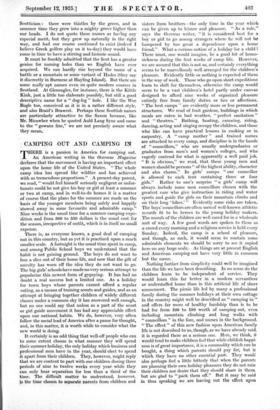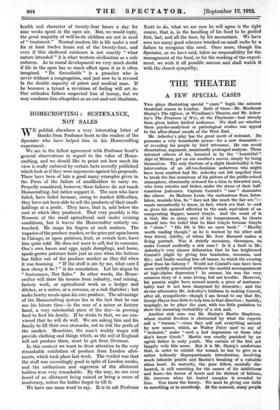CAMPING OUT AND CAMPING IN
There is, as everyone knows, a good deal of camping out in this country, but as yet it is practised upon a much smaller scale. A fortnight is the usual time spent in camp, and among Public School boys we understand that the habit is not gaining ground. The bOys do not want to lose a slice out of their home life, and now that the gilt of novelty has worn off the idea they do not want to go. The big girls' schools have made no very serious attempt to , popularize this newest form of gypsying. It has had no doubt a real success but a limited one. As a holiday for town boys whose parents cannot afford a regular outing, as a means of training scouts and guides, and as an attempt at bringing together children of widely different classes under a common sky it has answered well enough, but no one could say that unless as a part of the scout or girl guide movement it has had any appreciable effect upon our national habits. We do, however, very often follow the social lead of America after a pause for thought, and, in this matter, it is worth while to consider what the new world is doing.
It certainly is an odd thing that well-off people who can to some extent choose in what manner they will spend their summer holiday, the only holiday which business and professional men have in the year, should elect to spend it apart from their children. They, however, might reply that we are content to part with our children during three periods of nine to twelve weeks every year while they can only bear separation for less than a third of the time. The difficult matter to understand, however, is the time chosen to separate parents from children and sisters from brothers—the only time in the year which can be given up to leisure and pleasure. " As a rule," says the Overseas writer, " it is considered best for a boy or girl to go among strangers where he will not be hampered by too great a dependence upon a home friend." What a curious notion of a holiday for a child ! There must, one would imagine, be a good bit of home- sickness during the first weeks of camp life. However, we are assured that this is not so, and certainly everything seems to be marvellously well arranged for the children's pleasure. Evidently little or nothing is expected of them in the way of work. Those who go upon short expeditions learn to shift for themselves, otherwise the camp would seem to be a vast children's hotel partly under canvas designed to afford nine weeks of organized pleasure entirely free from family duties or ties or affections. " The best camps " are evidently more or less permanent structures. We read of fruit gardens, buildings in which meals are eaten in bad weather, " perfect sanitation " and " theatres." Bathing, boating, canoeing, riding, dancing, acting and singing occupy the children, and those who like can have practical lessons in cooking or in carpentry. A " camp mother " and trained nurses are attached to every camp, and discipline is in the hands of " councillors," who are usually undergraduates or graduates from men's and women's colleges, and who eagerly contend for what is apparently a well paid job. " It is obvious," we read, that these young men and women should be persons " of the highest ability, character and also charm." In girls' camps " one councillor is allowed to each tent containing three or four girls." Rather to one's surprise " a girls' camp will 'always include some men councillors chosen with the greatest care who give instruction in riding and water 'sports and guide the girls on their mountain climbs and on their long ' hikes.' " Evidently some risks arc taken. The boys' councillors are often men of well-known athletic records fit to be heroes to the young holiday makers. The morals of the children are well eared for in a wholesale sort of way. A few good words are spoken to them as a crowd every morning and a religious service is held every Sunday. Indeed, the camp is a school of pleasure, and though, as such, it would seem to contain some admirable elements we should be sorry to sec it copied here on any large scale. As things are at present English and American camping out have very little in common but the name.
Nothing further from simplicity could well be imagined than the life we have been describing. In no sense do the children learn to be independent of service. They would learn this far better in a modern servantless or understaffed home than in this artificial life of sheer amusement. The picnic life led by many a professional family during the summer holidays at their own cottage in the country might well be described as " camping in " and offers far more of healthy hardship than is to be had for from £60 to £80 worth of camping out, even including mountain climbing and long walks with " councillors " in the fore, and nurses in the background. " The effect " of this new fashion upon American family life is not described to us, though, as we have already said, it is regarded there as a serious one. Here, we think, it would tend to make children feel that while childish happi• ness is of great importance, it is a commodity which can be bought, a thing which parents should pay for, but in which they have no Other essential part. They would also perhaps feel a little bitterly that when the parents are planning their own holiday pleasures they do not mise their children nor desire that they should share in them, but are glad to " pick them off." But it may be said in thus speaking we are leaving out the effect upon health and character of twenty-four hours a day for nine weeks spent in the open air. But, we would reply, the great majority of well-to-do children are not in need of " treatment." Normal modern life is life under a roof for at least twelve hours out of the twenty-four, and even if this sheltered existence is not exactly " what nature intended " it is what western civilization as a rule enforces. As to moral development we very much doubt if life in the open has so much effect upon it as is often imagined. " Dr. Greenfields " is a preacher who is never without a congregation, and just now he is revered in the double capacity of priest and medical man. If he becomes a tyrant a revulsion of feeling will set in. Our orthodox fathers suspected him of heresy, but we may condemn him altogether as an out-and-out charlatan.











































 Previous page
Previous page